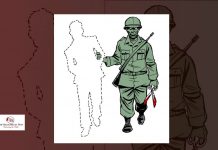The “Gwadar Ko Haq Do” movement that started in the coastal city of Gwadar over ten days ago has rippled across much of Makran and the adjacent areas. Supporters in these areas have imposed a shutter-down protest in solidarity with the Gwadar protestors and raised slogans in their support.
According to the details, the Makran and much of its environs observed a complete shutter-down protest in solidarity with the protestors in Gwadar who have been on the streets for the past ten days. In district Kech and Panjgoor, the banks, markets and other businesses were shut down in protest.
Traders’ associations in all these major cities unanimously agreed to impose a shutter-down protest in solidarity with the Gwadar protestors. They said that the Gwadar protestors are rightfully demanding their fundamental rights, and the authorities must contend with their demands. They said that the local fishermen want an end to the illegal trawling that has robbed them of their only economic lifeline – fishing – and the traders and transports want the border trade to reopen so that they can eke out an earning and provide for their families.
Admirers and supporters from the rest of Balochistan have flocked Gwadar over the past few days to participate in the protests and express solidarity with the protestors.
The “Gwadar Ko Haq Do” movement, an on-again-off-again campaign, has been going on for the past several months but gained momentum only recently. Thousands of protestors, led by Maulana Hidayat Ur Rehman, the General-Secretary of the Balochistan chapter of the Jamat-i-Islami, have gathered on the roads to protest for their fundamental rights.
Their primary demand is an end to the unnecessary checkpoint that dot much of Gwadar city and its environs. The protestors argue that the security forces stationed at these check posts are involved in all sorts of social crimes, like drug trafficking, public harassment and enforced disappearance. The security forces are known to stop the local people on an arbitrary basis, search from toe to head and ask for their CNIC card. When the civilians cannot procure the card, they are not allowed to cross the checkpoint.
The protestors are also demanding an end to illegal trawling in the Arabian Sea. They say that the trawling industry is robbing the sea of its essential aquatic diversity and marine life. Furthermore, the local fishermen are also not allowed to fish in the sea after certain hours. Because their survival depends on fishing, the fishermen have also participated in the protests.
Another demand is the reopening of the Iranian border crossing, a major trade route for the border regions of Balochistan. Due to the lack of employment, people in the border areas, like Gwadar and Kech, transport goods and merchandise to Iran to earn a meagre living for themselves. The border was made difficult when the Pakistani authorities imposed a draconian token system that has slowed the trade to a snail’s pace. In the new system, a vehicle can barely make two or three trips to Iran in one month, which cannot suffice for the economic needs of the traders.
The protestors are asking the authorities to reopen the border crossing so that the trade can continue as usual.






























